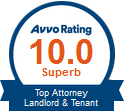Security Deposits are money that is collected by a landlord to compensate for any damage a tenant does to a rental unit. A security deposit for an unfurnished unit cannot exceed two months rent and the security deposit for a furnished unit cannot exceed three months rent. (Civil Code section 1950.5(c)). No part of the security deposit can be “non-refundable.” (Civil Code section 1950.5(m)).
In addition to a security deposit, a landlord can also charge an “application screening fee” to any potential tenant. (Civil Code section 1950.6). This application fee cannot exceed the landlord’s actual out-of-pocket costs. (Civil Code section 1950.6(b)).
It is important to note that, other than an application fee, a landlord cannot charge a new tenant any other “fees” over and above the security deposit limit. This is true regardless of what the landlord “calls” the fee. In other words the name of the fee or deposit is irrelevant. Only the total amount required matters.
For example: if a landlord offers to rent an unfurnished apartment for $1,000 per month, she can require a reasonable application fee and a security deposit of $2,000. In the alternative, she could also require a reasonable application fee, a security deposit of $1500, a “pet fee” of $350 dollars, and a “cleaning fee” of $150. However, she cannot require a security deposit of $2,000 AND any additional fees other than an application fee. And again, no part of any security deposit can ever be “non-refundable.” (Civil Code section 1950.5(m)).













